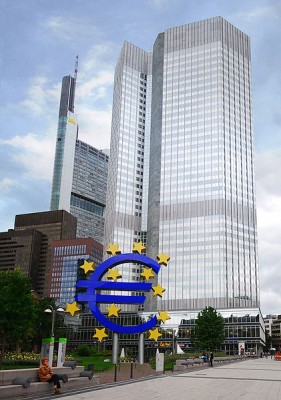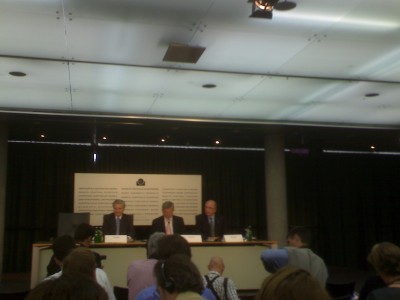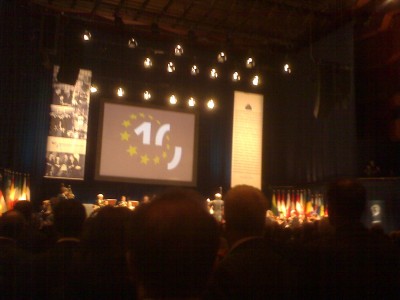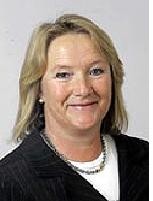 newsitems
newsitems  ECB Spokeswoman Schuller to EuroFora: Trichet sticks to Growth Forecasts revised Upwards +Innovation
ECB Spokeswoman Schuller to EuroFora: Trichet sticks to Growth Forecasts revised Upwards +Innovation
ECB Spokeswoman Schuller to EuroFora: Trichet sticks to Growth Forecasts revised Upwards +Innovation

After ECB recently "revised Upwards" its Forecasts for EuroZone Economy's Growth in 2010 and 2011, and pointed at Innovation as main driver, it didn't change, nor issued any new forecasts, ensured "EuroFora" ECB's Press Spokeswoman, Regina Schüller, in reaction to some controversial interpretations of ECB's chief, Jean-Claude Trichet's statements at nearby Frankfurt on Thursday, which apparently misguided some people provoking irrational moves at certain Stockmarkets.
ECB's latest Report forecasts an EuroZone Growth up to "+1.5% in 2010, and .. + 2.2% in 2011", while it points at "Innovation" as EU's way out of the Global Crisis, citting recent Facts which give it a crucial importance for EuroZone's "return to Growth" to catch up with the US, Japan or China, etc. But it falls short from saying how this aim could be achieved, at the moment that EU prepares for a stronger Innovation-driven 2020 Economic Strategy.
Meanwhile, US and Japan seem to grow even faster than the EU for the moment, but this appears due to classical Consumer Stimulus, "Temporary" measures (boosting fex. Car and House sales, etc), while EU's stimulus policies apparently focus more on productive investment for modern activities, due to catch up with the US in the Future with a stronger, renovated European economy.
Previous "soft" EU economic policy, known as "Lisbon Strategy", notoriously failed to push RST spending to 3% of EU's GDP.
All this makes it even more urgent now, to find new ways to stimulate and planify EU's RST and Innovation policy, in the framework of a new "2020 Strategy" due to be prepared during the incoming Spanish EU chairmanship, which will debate its Programme at EU Parliament next week in Strasbourg with Spanish Prime Minister Jose Zapatero, in the run upo to an exceptional February 2010 EU Summit, convoked by EU Council's President, Herman van Rompoy, (together with the Environment/Climate issues), in view of final Economic policy Decisions at the Spring 2010 EU Council on March.

- "In his statements made on Thursday", Jan. 14, 2010, "the (ECB's) President (Jean-Claude Trichet) simply referred to the Forecasts published at the end of 2009 (See above). There are No New forecasts" now, ascertained "EuroFora" the Director of ECB's Press Service, Spokeswoman Regina Schûller. On Economy, "next forecasts are due on March" 2010, she added.
ECB "revised Upwards" its earlier "projections" for "the range for 2010", according to its latest Report, published at the end of 2009. It observed that "economic activity in the euro area improved further in the 3rd quarter of 2009, with real GDP growth returning to positive territory", "by 0.4% quarter on quarter", according to Eurostat’s first estimate", while "available survey data suggest that the recovery continued during the 4rth quarter of 2009" also.
"Eurosystem staff project annual real GDP Growth of between ..+0.1% and +1.5% in 2010, and between +0.2% and + 2.2% in 2011", ECB's Report issued on 29.12.2009 said..
+ Moreover, "there may be stronger than anticipated effects stemming from the extensive macroeconomic Stimulus being provided and from other policy measures taken".
"Confidence may also improve further, and Foreign Trade may recover more strongly than projected", it added.
"At present, the Euro area is benefiting from ...a recovery in Exports, as well as from the significant macroeconomic Stimulus under way and the Measures adopted to restore the functioning of the Financial system", added to "the inventory cycle", ECB observed, showing the success of EU Countries' economic recovery plans.
But it warned EuroZone to advance carefuly, because "activity is likely to be affected ... by the ongoing process of Balance sheet Adjustment in the financial and the non-financial sector" also "Outside the Euro area", (fex. in the USA, Japan, etc). And it advised to keep an eye on "a number of the supporting factors (which) are of a Temporary nature" (fex. the Stimulus poliies), for eventual "renewed increases in Oil and other commodity prices, ..intensification of Protectionist pressures, and possibilities of disruptive Market movements related to the correction of Global imbalances". I.e. mainly because of External factors, where "risks" look "largely balanced".
_______
In EuroZone, "Inflation is expected to remain Moderate over the policy-relevant horizon, with overall price, cost and wage developments staying subdued in line
with a Slow Recovery in demand in the euro area and elsewhere", but even better than ECB's "aim of keeping inflation rates below, but close to, 2% over the Medium term" : Indeed,"the December 2009 Eurosystem staff projections foresee annual HICP inflation of (only) 0.3% in 2009, between 0.9% and 1.7% in 2010, and between 0.8% and 2.0% in 2011", it ensured.
But, "several countries will have to start (Fiscal) Consolidation in 2010, and all others in 2011 at the latest", ECB observed, hoping that "increases in indirect Taxation and administered prices" wil not "be stronger than currently expected", and that Global "Commodity Prices" (fex. on Energy) will remain moderate.
-----------------------------
On "developments in the World Economy", ECB foresees "a further Expansion in Global activity", according to "the latest indicator-based evidence".
Already, "the return to Growth in Global Economic activity has also coincided with a recovery in World Trade""the World Economy", ECB added.
F.ex. "the Output Index reached ...a Level which represents the Highest reading since late 2007", ("54.2 in October 2009, up from 53.2 in the previous month), while "the overallGlobal Purchasing Managers’ Index (PMI) has continued to increase over recent Months, movingwell above the expansion/contraction threshold".
"Manufacturing remained the main driver of Growth, but Services also continued to indicate an Expansion. The Recovery in Global Manufacturing continued in November, for the 5th Month in a row, and remained rather Broad-based", ECB noted.
This attests a "gradual" "return to Growth in the major emerging markets, as well as in a number of advanced economies" : "The contraction in Global growth in the last quarter of 2008 and the 1st quarter of 2009 was followed by Positive Growth in the 2nd and 3rd quarters of 2009'".
"At the same time, Global Inflation rates have remained Low. In the OECD countries, headline CPI rose (only) by 0.2% in the Year to October" 2009, and ECB attested a "Downward pressure on Prices in recent Months".
-------------------------
But "in the United States .... real GDP increased by 2.8% in annualised terms in the 3rd quarter of 2009", ("compared with a contraction of 0.7% in the 2nd quarter"), "economic conditions improved and activity recovered", "according to the Bureau of Economic Analysis".
However, the US "Pick-Up in economic activity reflected an increase in Consumer spending", which was added to "a strong rebound in Residential investment and Exports", as well as to "a less pronounced pace of inventory liquidation". Indeed, the American Government Stimulus Measures temporarily supported Private Demand, particularly in the Auto and Housing sectors", ECB observed.
An equivalent difference to European policies is seen "in Japan", where "the pace of economic activity picked up in the 3rd quarter of 2009, (while Consumer Prices continued to decline)" : "quarterly real GDP grew by 1.2% in the third quarter of 2009, corresponding to the Highest quarterly Growth rate in more than two Years" !
Here too, as in the US, "GDP growth in the third quarter of 2009 was mainly supported by Domestic Demand", which was added to "net Exports". "The Recovery was supported by the Fiscal Stimulus package" of the Japanese Government, after which, "Consumer Spending rose by 0.7%", and "Firms’ investment increased for the first time in six quarters, by 1.6%". "However, Residential Investment continued to fall sharply", and "looking ahead, the pace of improvement in economic activity is likely to be more Moderate" in Japan.
The point became obvious in "China, (where) annual GDP Growth accelerated to 8.9% in the third quarter of 2009... Fixed Asset Investment growth, driven mainly by the Fiscal package, contributed 7.3 % points to GDP Growth (which stood at 7.7% overall) .. from January to September....Private sector Investment also started to pick up, mainly driven by ..the Real Estate sector. The contribution from Consumption to GDP growth remained robust, at 4% points from January to September". But, already, in China "the contribution of net Exports was negative, however, and the Trade Surplus decreased to 4.3% of GDP .. from January to September 2009, from 6.1% in the same period last year (2008). The decline in the Trade Surplus was caused by a rapid Recovery in Imports, in turn boosted by ...an increased Demand for Imported commodities. The recovery in Exports was considerably Slower", ECB observes for China.
To face such a rising Global Competition, Europe obviously needs to act fast and succeed to catch-up in healthy and sustainable Growth with the US, Japan and/or China etc. in the medium and long term, thanks to EuroZone Government's preference to stimulate less Consumers' Demand and more Productive Investement in Strategic areas of High Technologies for the Future :
>>> Therefore, in the EU, "Policies that enhance Competition and INNOVATION are ...Urgently needed to speed up restructuring and Investment and to create New business Opportunities", stressed in conclusion ECB's latest Report.
Because, "most estimates indicate that the (Global) financial Crisis has reduced the Productive capacity of the Euro-area economies, and will continue to do so (at least) for some Time to come", according to ECB. That's why, in addition to the traditional remedy of "Labour market Flexibility and more effective Incentives to Work", "In order to support sustainable Growth and Employment", EU has to "Urgently" focus on "Policies enhancing Innovation".
---
Moreover, at another ECB paper on EU's 2020 Economic Strategy, issued on Thursday, Jan. 14, 2010 at nearby Frankfurt, ECB stresses that "Policies that enhance competition and Innovation are Urgently needed to speed up restructuring and Investment, and to create the Productivity gains necessary to overcome past weaknesses. This would allow European countries to remain competitive in an increasingly interconnected, Global economy".
Therefore, ECB "agrees" with EU Commission on "the importance of Research and Innovation for stimulating Productivity gains", among "key" issues to an "EU 2020 Strategy".
In parallel, remains also a need for "sound Institutions supporting appropriate Wage-setting, facilitating job Mobility and matching in Labour markets and creating incentives to work", i.e. "the establishement of efficient and Flexible Labour Markets", according to EU Commisssion), which "are required to attain high levels of Employment and labour Participation", ECB added, asking both for a "greater Flexibility in the EU economy and an enhanced Governance framework".

( ECB faced its 1st Global Crisis since the foundation of EuroZone, shortly after it celebrated its first Decade with an exceptional Summit in Frankfurt on 6.2008)
* In doing so, "the 300 million Citizens' strong Monetary Watchdog, has (also) to keep a Unified policy for 16 EU Member Countries, more or less advanced on Structural Reforms, Trichet said on Thursday.
But, "Europe, ...compared ..with the US", has "more or less the same order of magnitude of standard Deviation" "at various indicators such as Growth, Inflation, unit Labour cost evolution", as "very Vast Single economy of more than 300 million Citizens", he observed.
Apparently, such local differencies should be taken into account when considering Trishet's estimation that, "for some Time to come .. it's "likely" that "Unemployment in the Euro-area is expected to increase somewhat further", while the .. Economy is expected to Grow only at a Moderate pace in 2010", as he said.
In EuroZone, ECB's Chief confirmed that "as an average for .. (the) year (2010), the mainstream of experts and analysts, as well as our own staff, is projecting slightly Positive Growth" : "We have a Period in front of us which is, fortunately, in black figures (i.e. with Positive Growth)", he ensured.
To a Question if he "see(s) any risk at all of a set back of the euro zone’s recovery in the 1st Quarter" of 2010, Trichet replied that, "as we have frequently said", ECB "do(es) not exclude that "we could pretty well have a rate of growth from quarter to quarter that would go up and down" : "we have a Bumpy road ahead of us”. "Since the start of the black figures" (i.e. of Positive Growth), we have never claimed Victory. We have always said we have to remain alert and prudent", he advised.
------------
But ECB's Chief was clearly Optimist on Inflation : "We see ...No Risk for a destabilisation of our Prices. Uncertainty and risks in both directions ..are balanced". ECB's decisions have "permitted us to anchor, very Solidly, inflation rate expectations ..in all circumstances, including in very difficult circumstances like today", he boasted.
"We expect Price Stability to be maintained over the Medium term, thereby supporting the Purchasing Power of Euro-area Households", ECB's chied reiterated.
----------
To a Question on "Financial System Reforms", touching upon Global Governance, Trichet replied that "we did our job properly in the past because we took very Bold Decisions and avoided depression. It is extremely important that all the economic agents realise the seriousness of the situation we would have had without the Rapidity and the Boldness of the Decisions taken by the ECB and other central Banks or the decisions of our Governments"
"But again, this is no time for complacency. We have a very hard job ahead of us", ECB's chief warned. "We cannot afford to have a Fnancial system which is as fragile in the Future as it has proved to be in the Past. Our Democracies in particular would not accept that. ...So we are obliged to find appropriate ways for making the (Financial) system more Resilient", "we are called upon to reform the financial system", he stressed, reminding also the recent job done in several ways, fex. through "the ECB, "the Financial Stability Board", "the Basel Committee", and "the G20", "the International Community", etc., in "enlarging Global Governance".
Main Menu
Haupt Press Deontology/Ethics 2009 Innovation Year EU endorses EuroFora's idea Multi-Lingual FORUM Subscribers/Donors Häufig gestellte Fragen Die Elxis Lizenz Erweiterte Suche EuroFora supports Seabird newsitems In Brief European Headquarters' MAPs CoE Journalists Protection PlatformBRIEF NEWS
- 00:00 - 02.06.2021
- 00:00 - 18.10.2020
- 00:00 - 19.06.2020
- 00:00 - 18.05.2020
- 00:00 - 20.04.2020
- 00:00 - 02.02.2020
- 00:00 - 09.12.2019
- 00:00 - 27.11.2019
- 00:00 - 16.11.2019
Popular
- Yes, we could have prevented Ferguson riots says World Democracy Forum's Young American NGO to ERFRA
- Spanish People Elect CenterRIGHT Majority with 1st Party and Total of 178 MPs (6 More than the Left)
- Pflimlin's vision
- The European Athletic "Dream Team", after Barcelona 2010 Sport Championship Results
- Source Conseil d'Europe à ERFRA: Debatre Liberté d'Opposants à Loi livrant Mariage+Enfants à Homos ?
- Head of BioEthics InterGroup, MEP Peter Liese : "Embryonic stem cell research reaching its END" !?
- Spain: Jailed Turkish Terror suspect with Explosive,Drones,Chechen accomplices stirs Merah+ Burgas ?
- UN Head Ban Ki Moon at CoE World Democracy Forum : - "Listen to the People !"
Latest News
- Test Photos (f.ex.+ Invit to EU + Korea Peace meeting)
- EUOmbudsmen Conference 2022: Digital Gaps affect People's Trust threaten EF Project on EU Future ?
- French Election : Black Out on Virus, but Obligation for Fake 'Vaccines" Challenged
- Both French Presidential Candidates point at "Humanism" in crucial times...
- France : Zemmour = Outsider may become Game Changer in Presidential + Parliamentary Elections 2022
Statistics
Besucher: 60631337Archive
Login Form
Other Menu

They voted to "freeze" UK Government's draft to put People in jail for 42 Days on "anti-terrorist" suspicion without charge, or they abstained. Don't they look suspect ?
-------------------------
CoE's debate on UK controversy stirs PanEuropean check of anti-terror suspects' imprisonment
Former Leftists of the Sixties would boil in hot water if they heard PACE's debate on the controversial 42 days detention without charge, currently drafted by the British Government :
A "Socialist" Government, a Socialist PACE Rapporteur and a Socialist Chair of PACE's Legal Committee, opposed a .. "Conservative" amendment (supported by .. Liberals, Democrats, etc), to freeze the measure, in order to protect Citizens' Freedom, by "waiting" until CoE's Venice Committee checks its conformity with Human Rights' principles.
"Left"'s support to Conservative-Lib.Dem's criticism, wasn't enough to obtain a majority, nor to make things as they were back in the good old days, when "Left" and "Right" had a clear meaning, as "liberty" and "restrictions"...
Conservatives and most Democrats were joined by the Left in voting for the "freeze", as well as Liberal Paul Rowen, while Socialist MEP Ivan Popescu, an experienced MEP from Ukraine (PACE Member since 1996-2008) abstained. But most Socialists, added to a few Liberals and EPP's Right, voted against.
Fortunately, someone inside PACE had the wise idea to shorten the Debate for less than 1 Hour, and put it on the Agenda only at the end of an exceptionally busy day, towards the end of the Evening, when most MEPs had already gone to taste wins and foods at various Receptions all around Strasbourg's "European" area : As a result, not even 42 MEPs weren't present..
Socialist Lord Tomlinson accused the leaders of the PanEuropean Assembly, in its highest body : the "Bureau", to "lack wisdom" by deciding to hold a Debate on an issue that neither the Socialist Chair of the Legal Committee, nor its Socialist "reluctant Rapporteur", did "not want to do", ...

Finally, everybody (critics and supporters alike) was happy to agree, in substance, that the controversial measure "may" gravely violate Human Rights, and therefore, PACE asked Legal Experts of Venice Commission to check UK Government''s plans.
But this might take more than .. 42 Days to do, since PACE's Rapporteur asked the Experts to enlarge their study in a PanEuropean comparison of all that is happening on "anti-terrorism" legislation in 47 CoE Member Countries, including Russia, Turkey and Azerbaidjan..
Bad lack : "The existing 28 days’ detention without charge in the UK is, in comparison with other CoE member countries, one of the most extreme : In Turkey, the period is 7,5 days, in France 6 days, in Russia 5 days, and in .. the U.S. and Canada just 2 and 1 days respectively", denounced Democrat MEP Ms WOLDSETH from Norway..

"Numerous respected human rights organisations, including Liberty and Human Rights Watch, have expressed serious concern" "The proposed legislation ...could easily lead to extensive abuses. ...Detention for 42 days means six weeks in which one is taken away from one’s family, friends, home and livelihood only to be let off without being charged. That will destroy lives and isolate communities", she added.
- "3 years ago, the UK Government sought to increase the period of pre-charge detention from 14 days to 90 days. Not long before that, it had been only 7 days. There was a vigorous debate ...and a ...compromise was reached of 28 days. We have to ask whether there are proper safeguards in place to extend the period to 42 days. I suggest that there are fatal flaws", reminded British Conservative Clappison.
- "What sort of society holds someone in detention for 42 days and does not have to tell the person who is in prison why they are there, or explain the suspicions that arose and led to their detention? What sort of society believes that that is the way to treat its citizens? That is an appalling injustice, ...A 42-day detention period will not make the UK safer. Instead, it will be the first step to giving in to terrorists; it is saying that we are prepared to sacrifice our democratic rights and the principles for which we have stood for centuries", criticized British Liberal Michael Hanckock

"Comments made ...by Norwegian delegates are unfortunate", replied British Socialist MEP Ms.Curtis-Thomas, accusing them to "besmirch the reputation of our police force, which is one of the Best in the World", as she said, believing that "there are significant safeguards ...to ensure that individuals are not subjected to unlawful detention"

PACE "has serious doubts whether ...the draft legislation are in conformity with the ...case-law of the European Court of Human Rights. A lack of ..safeguards may lead to arbitrariness, resulting in breaches of ... liberty and ...right to a fair trial". PACE "is particularly concerned that: ..the judge ..may not be in a position to examine whether there exist reasonable grounds for suspecting that the arrested person has committed an offence;"; that "... representation by a lawyer may be inappropriately restricted or delayed;" that "information on the grounds for suspicion of a person ...may be unduly withheld.. ;" that this "may give rise to arrests without the intention to charge;", and; in general, that "prolonged detention without proper information on the grounds for arrest may constitute inhuman treatment", says Klaus De Vries' Report, adopted with 29 votes against zero.

Records don't say if it took him 42 Days to draft his Report, but, at least, he knew why...


















